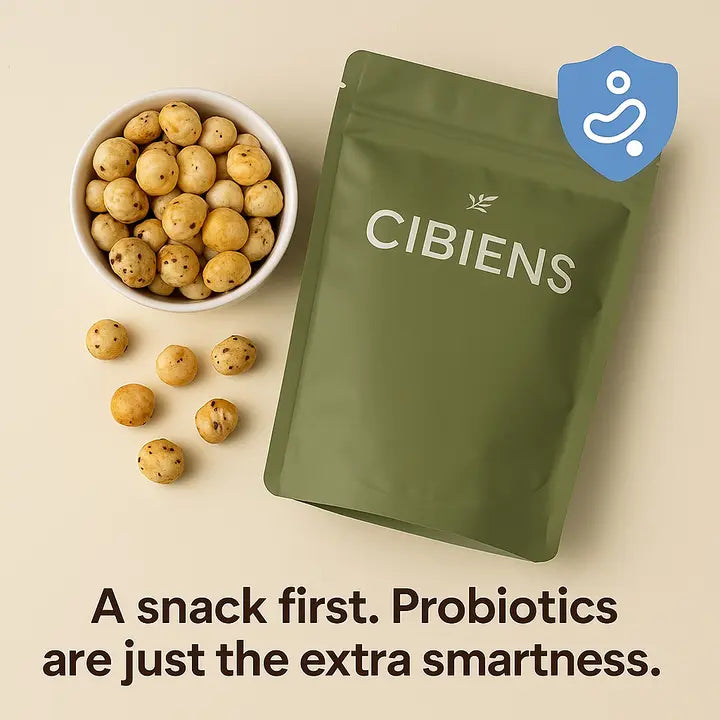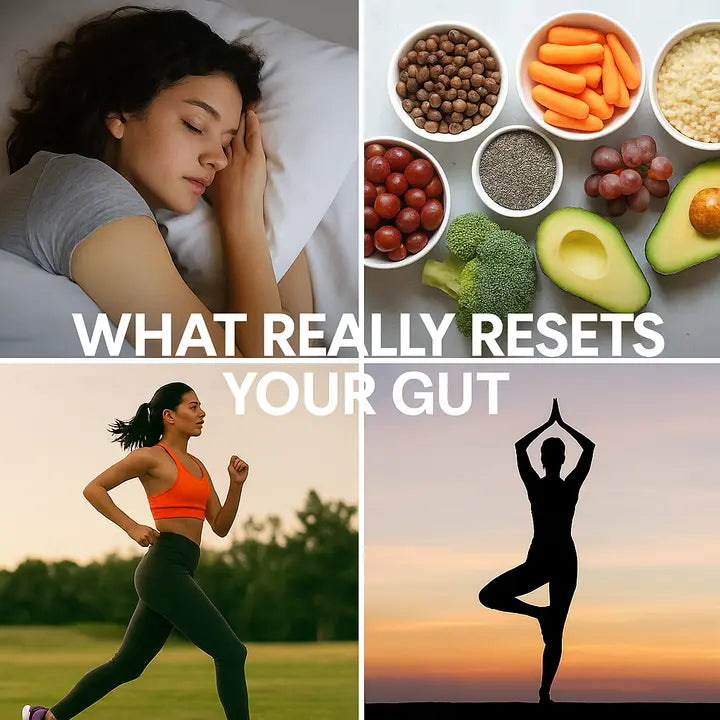Probiotics: Between Science and Marketing
Walk into any supermarket aisle today and you’ll spot the probiotic brigade: supplements, drinks, detox kits, and powders that claim to “reset” your gut in seven days flat. They scream billions of CFUs (colony-forming units), fancy microbiome jargon, and sometimes even promise you glowing skin, sharper focus, or fewer mood swings.
No wonder people are sceptical. In fact, some have gone as far as calling probiotics “the next marketing scam.” And honestly? They’re not entirely wrong. The truth is far less glamorous: your gut doesn’t reset itself because of a pill, it resets itself because of how you live i.e. what you eat, how you sleep, how much you move.
So, are probiotics hype? Or help? The answer, as always, sits somewhere in the middle. Let’s unpack this without the drama.
The Basics: Your Gut Is Alive (Literally)
Your gut is home to trillions of bacteria: good, bad, and somewhere in between. Together, they’re called the gut microbiota. Think of them as tenants in a crowded Mumbai apartment building: some pay rent on time, some freeload, some throw loud parties.
What keeps the peace?
- Fibre (their main food)
- Fermented foods like curd, dosa batter, kimchi, pickles
- Sleep and exercise to regulate their rhythm
When this balance goes off, you feel it. Bloating, constipation, low energy, even weaker immunity. Gut health isn’t just about digestion, it’s the command centre for a lot more.
Where Probiotic Marketing Goes Wrong
Most probiotic claims fall flat because:
- Survival rate matters
Sure, a pack might say “5 billion CFUs.” But how many of those bacteria actually survive your stomach acid and reach the large intestine (where 90% of gut bacteria live)? For many strains, the answer is: not much. - Generalisation is the norm
Marketers often cite studies but skip the fine print—those results may apply only to a very specific strain, dose, and condition. - Supplements ≠ lifestyle fix
Pop all the capsules you want, but if your diet is 90% processed, your sleep is patchy, and your stress levels are through the roof, no probiotic is going to swoop in and save the day.
That’s why blanket statements like “probiotics don’t work” gain traction. Because, in isolation, they often don’t.
The Smart Middle Path
Here’s the nuance: while not a magic pill, probiotics aren’t useless either. The key lies in:
- The strain used. Different strains do different things. You can’t expect one species to solve everything from constipation to immunity.
- The delivery format. Some strains die in processing. Others survive better when paired with food rather than taken solo.
- Lifestyle synergy. Probiotics can support a gut that’s already being cared for with fibre, sleep, and movement. They’re helpers, not heroes.
So, What About Good Old Dahi?
Great question. Dahi is a silent superstar and is packed with Lactobacillus acidophilus, Lactobacillus casei, and Bifidobacterium species. It’s cheap, accessible, and part of our dadi/nani-approved diets.
So why bother adding probiotics to a packaged snack?
Because not everyone eats dahi daily. Or kimchi. Or enough fibre. In urban life, food habits are inconsistent. A snack fortified with a stable, studied probiotic strain isn’t a replacement for traditional foods, it’s a nudge. A convenient top-up that fits into your lifestyle when you’re stuck in traffic or at your desk.

The Cibiens Way: Probiotics With a Purpose
When we decided to add probiotic in our snacks, we asked ourselves the same tough questions critics do:
- Do these bacteria actually survive digestion?
- Is there credible research behind them?
- Will this feel like a gimmick or like smart food?
That’s why we use Bacillus coagulans SNZ 1969, a spore-forming probiotic strain. Translation: it can survive heat during roasting, withstand stomach acid, and actually make it to the large intestine alive. This isn’t pulled from thin air; multiple studies have shown its stability and benefits for digestion and immunity.
And we’re not shouting “miracle cure.” Our snack is first and foremost tasty and balanced. The probiotic is an extra layer of smartness, not the entire story.

What Really Resets Your Gut
Probiotics are just one piece. For gut health that actually lasts, here’s what science—and common sense—agree on:
- Feed your gut friends. Fibre from vegetables, fruits, beans, nuts. No fibre = hungry bacteria = unhappy gut lining.
- Fermented foods. Curd, idli, dosa batter, pickles bring living cultures your body knows how to use.
- Sleep like it matters. Your gut microbes follow a circadian rhythm. Pulling all-nighters? They get confused too.
- Move. Exercise produces compounds like pyruvate and lactate that beneficial bacteria love.
- Weight balance. Excess fat tissue (adiposity) messes with microbial balance.
So, Scam or Smart?
Here’s our stance:
- Probiotic supplements marketed as miracle cures? Overhyped.
- Probiotics as a complement to real food and good habits? Smart.
- A crunchy, flavour-packed snack that’s better than fried chips and sneaks in a billion gut-friendly allies? We’ll take that.
The Bigger Picture: Food That’s Honest
At Cibiens, our philosophy has always been clear:
- No shady fine print.
- No fear marketing.
- No chasing fads.
We believe food should fuel your real life, not become a guilt trip. Probiotics are not our brand identity, they’re just one of many smart, science-backed choices we make when crafting snacks.
Because food shouldn’t feel like punishment or privilege. It should taste good, make sense, and maybe even help your gut along the way.
The Takeaway
Don’t buy into probiotic “detox resets.” Don’t dismiss probiotics as total rubbish either. Look for the middle path: real food, good habits, and science that doesn’t need a halo.
Your gut will thank you, not overnight, but surely over time.
Snack smart. Live better.




